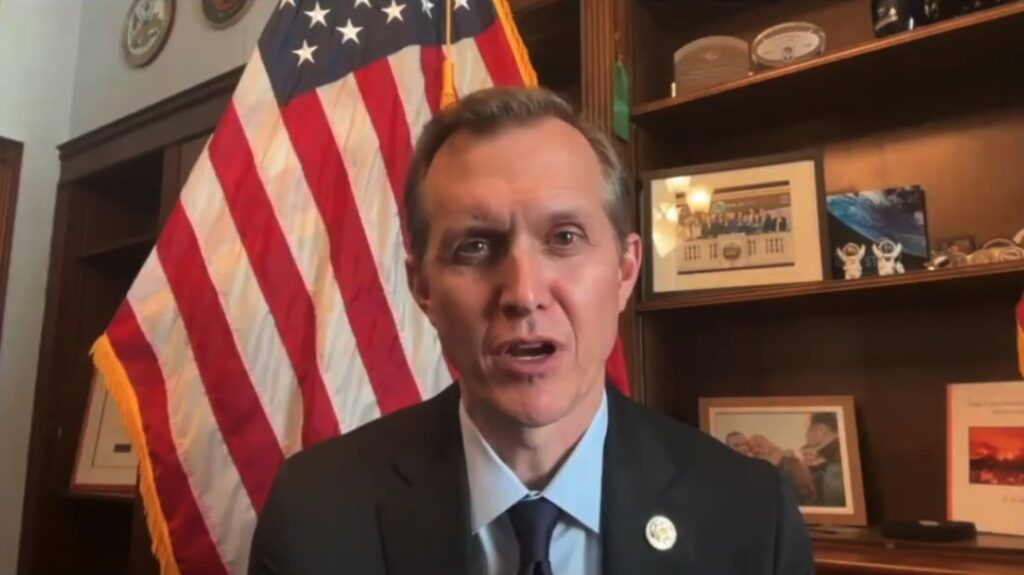
WASHINGTON — A leading Democratic member of the House Science Committee has voiced strong opposition to the proposed steep cuts in NASA’s fiscal year 2026 budget, arguing that the administration does not fully appreciate the value of science to both NASA and the nation. Speaking at a SpaceNews webinar on June 10, Rep. George Whitesides (D-Calif.), vice ranking member of the House Science Committee, criticized the budget proposal released on May 30.
The proposal suggests a nearly 25% reduction in NASA’s overall budget, marking the largest single-year cut, alongside a drastic 50% cut to NASA science programs. If implemented, these cuts could lead to the termination of dozens of missions, which Whitesides described as “catastrophic.” He linked these cuts to broader reductions in science programs across other agencies, such as the National Institutes of Health and the National Science Foundation.
Implications for U.S. Scientific Leadership
Whitesides expressed concern that the budget cuts represent a broader assault on the scientific establishment.
“It seems like there is not an understanding on the part of the administration of the importance of science and technology in our economy and our leadership in the world,”
he said. He emphasized the crucial link between research and competitiveness, suggesting that the administration may misunderstand the utility of scientific pursuits for the American economy and global leadership.
As an example, Whitesides highlighted the use of multispectral imagery in Earth science, noting that China is rapidly advancing in this area.
“For us to give up our leadership in multispectral imagery is not just an issue related to atmospheric science, but it handicaps our ability to find key minerals, crucial for the future economy,”
he stated.
Budget Proposal Details and Congressional Response
The detailed budget proposal, although slightly less severe than earlier fears, still includes significant cuts. A leaked document in April suggested the cancellation of the Nancy Grace Roman Space Telescope, but the full budget only reduces its funding for 2026. Whitesides acknowledged some movement but deemed it insufficient.
He is in discussions with fellow House Science Committee members and appropriators about potential responses to the budget proposal.
“There is a general view that these cuts would be catastrophic to NASA as proposed,”
he said, indicating that strategies are being considered to counteract the proposal.
Artemis Program Concerns
The budget also proposes ending the Space Launch System (SLS) and Orion programs after the Artemis 3 mission, shifting to commercial capabilities. This has sparked opposition from industry groups and political figures, including Sen. Ted Cruz (R-Texas), who seeks additional funding to extend these programs.
Whitesides argued against prematurely ending SLS and Orion, noting ongoing work on future missions. He called for more information about the proposed commercial replacements and emphasized the need for a sustainable long-term space exploration program.
“The opportunity of this moment is to have bipartisan agreement around a long-term exploration plan,”
he said.
Leadership and Workforce Challenges
The White House’s recent withdrawal of Jared Isaacman’s nomination as NASA administrator has added to the agency’s challenges. Whitesides criticized the decision, stressing the need for permanent leadership to navigate the proposed budget cuts.
“It’s crucial that we get someone new as soon as possible,”
he urged.
The proposed budget also threatens NASA’s workforce, potentially reducing it by a third. Following a 5% reduction earlier this year, NASA announced new voluntary retirement programs to manage the cuts. Whitesides warned that these measures risk losing some of NASA’s best employees, who might find opportunities elsewhere.
He advocated for Congressional support through appropriations and authorization bills to safeguard NASA’s future.
“We need to be the backstop in a time when it seems like the administration does not value a strong future for NASA,”
he concluded, emphasizing the importance of a positive outlook for the agency.





